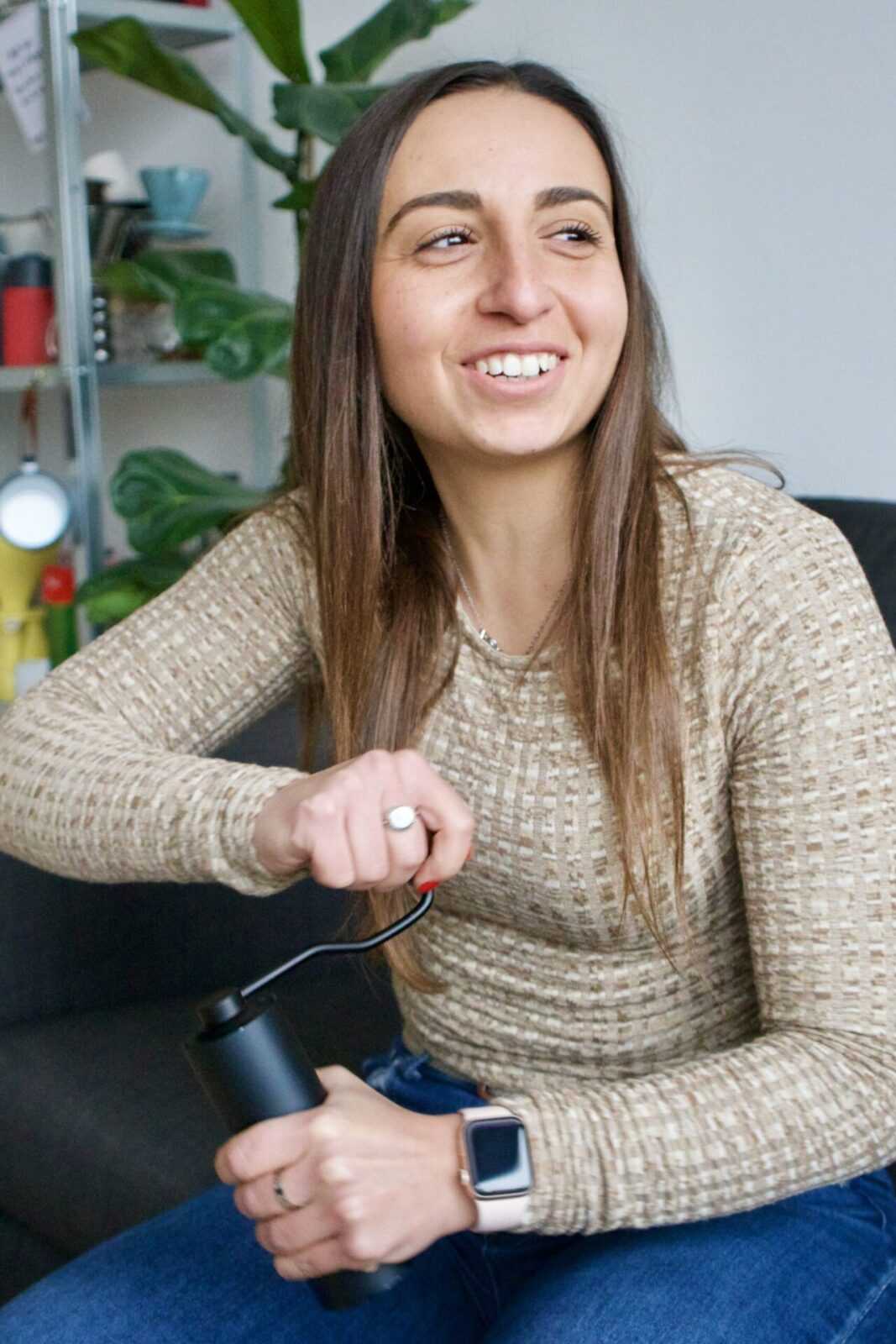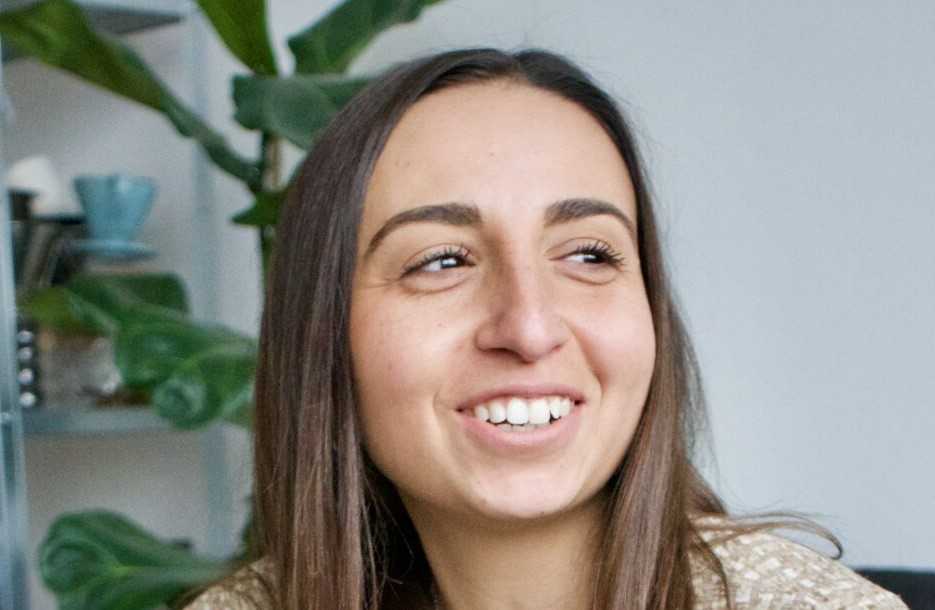MILAN – Federica Federico told us about her experience as a speciality coffee professional directly from London, where she set up and grew her business Faith in Coffee, whose name already gives a strong indication of how passion for this drink is a way of approaching life with a focus on quality. In order to fully understand what lies behind this small female enterprise, we spoke to its founder, an expert on the universe surrounding the speciality bean.
Faith in Coffee was founded in 2021 as a result of Federica Federico’s passion for coffee: what does this project of hers offer, and who is it aimed at?
“Yes, Faith In Coffee was born from my passion for coffee, but actually its name was born in 2018, when I got certified as an AST and that pushed me to find new ideas to change my profile on Instagram. So I thought of translating the diminutive of my name, “Fede” to Faith, thus giving it a double meaning, even a bit funny. Then the project was born, with the ultimate goal o

f spreading the culture of quality coffee to as wide an audience as possible, educating more customers. As to how to do this, I have a few projects in the
pipeline, but I prefer not to reveal them yet.
Firstly, we offer a selection of 3 different specialties, including the Jungle Whispers blend (medium-dark natural Brazil, washed El Salvador), Connected souls (medium-light washed Ethiopia) and Moonlight jive (medium-light washed El Salvador). While a fourth will be released to celebrate Lover’Day (medium-dark).
The labels of these three proposals are themselves designed as a sign of rebirth after the Covid: all 3 represent desires expressed during the long period spent locked up at home. Desire to go out, when we were forbidden even to go to the park, desire for contact with people and lastly, desire to have fun.
In the world of coffee for most of my life, I have noticed that a very big problem is the lack of training within the roasting companies that supply coffee shops, restaurants etc… I think it is in our interest to serve our product 100% to the final consumer, so why not train the barista who is going to prepare it?
So why not train the bartender who is going to prepare it? Another service, then, and a 12-hour training for wholesale customers, providing the basics for a good drink delivery. I am of the opinion that everyone should have the basic skills to prepare an espresso, whip and pour milk or offer a filter coffee. And this is especially true for those working in the hospitality world.
We all know that if we leave the tea bag to steep in hot water for too long we will get a bitter end result, or that if we don’t tilt the glass for beer it creates too much foam: yet I still see that we struggle to make a moka coffee, (in Italy more than in the UK). There really is still a lot to do and to spread.
Finally, as Faith in Coffee I am collaborating with several universities and hotels at the moment, to organise workshops and lectures in order to spread the culture of coffee as much as possible. I can say that I am very happy with the results so far.
Our products together with the brand were only launched in October 2021 and we are very happy with what we have achieved in just 3 months of work. People really appreciate it when there is passion behind a business, a woman in business and with lots of ideas for young people.”
You come from a Sca educational background and 10 years in the family business, then London. What made you leave everything behind to work and live abroad with Faith in Coffee?
“I was 10 years old when my parents opened “Mileto Caffè”: a bar in a small square on the outskirts of Rome. I’ll never stop thanking them for giving me the chance to notice and then to cultivate this passion of mine within their premises. Unfortunately, after a few years I began to feel the need to see what lay beyond that suburban reality and to learn English in order to put into practice everything I had learned during those years of training with the Sca. I tried to put my skills into practice in Rome 6 years ago, unfortunately with little success. Now the coffee community in Italy has expanded considerably and more
and more people are interested, to the delight of all the enthusiasts.”
Why not stay in Italy, where there is a real need to communicate and spread the culture of coffee? Is the road too uphill for young people?
“In Italy, as we know, it’s all uphill, unfortunately. It is disappointing to see that young people have to seek success abroad. Not that London is easy to live in – it’s not easy at all. It’s very expensive, there’s a lot of competition in the coffee sector and as a result it’s not easy to get noticed, but fortunately there is a meritocracy and there seems to be a lot more positivity in the air. London in particular has this sense of freedom where everyone does what comes into their heads, unimaginable things, without coming across as crazy.
Espresso machines in apecars and moped-cafeterias inside churches and telephone booths: coffee is bought and drunk everywhere, on the metro, in the car, in the office. Doesn’t it seem to you, reading these examples, that there is more of a coffee cult here than in Italy?”
What do you think needs to be done to evolve coffee in Italy, both from the point of view of the operator, the consumer and perhaps even the roasters?
“In Italy we have this conception of coffee that is untouchable. I think it’s quite risky for an operator or a roaster to put their face into trying to evolve or change the way of drinking, preparing or even roasting coffee in Italy, because they run the risk of being judged and criticised by a good part of consumers who are still, unfortunately for them, closed-minded. I respect many of my friends who have chosen to stay in Italy to spread quality coffee and I understand their struggle to do so. I think Italy is on the right track: I see that the drink, together with the preparation of the barista and the consumer, is growing and evolving very fast.”
What is happening in the UK as far as the Horeca is concerned? Have all the Italians left and who has stayed?
“Indeed, some Italians have returned to Italy. But I assume they have done so regardless of Brexit. Many people come and go, many decide to gain experience abroad. The Brexit I think has only anticipated their return to their own country. The problem now is that for new people, it’s not easy to get in. In this very difficult historical period, we are witnessing a not indifferent lack of personnel in hospitality for these very reasons. The on-trade is having great difficulty finding workers, and qualified workers at that. So we are planning training projects to help these companies fill these roles. ”
How is the specialty sector in the UK? Is it in good health?
“Speciality coffee in the UK is very common. You can find speciality coffees even in the supermarket, the local shop, the bakery and the least frequented coffee shop. I would say that most of the time we are talking about lighter roasted coffee rather than real specialty.
Which is just as well in my opinion, because we like to talk about specialty but we don’t forget that we are talking about the raw material (the green coffee) first and foremost. From the moment we put it in the roaster, it’s up to us, (then the grinder and the barista) whether we highlight the characteristics of the good product or ruin it.”
Between Brexit and Covid, are you seeing radical price increases and supply difficulties there too? Are the reactions of consumers and managers being felt as in Italy?
“Yes, we are encountering a lot of difficulties in importing and exporting, especially from and to Europe. A lot of the equipment and machines come from Italy. For food and imported coffee, we will certainly be stocking up on a large scale to ensure that orders are placed on time. However, I donìt know how advantageous this operation can be due to the limited shelf life of coffee and the difficulty in serving a product that remains constant over time. Not to mention the added customs costs. ”
Are you thinking of going back to bring your know-how from Faith in Coffee in Uk to the home of espresso?
“At the moment I’m not thinking of going back to Italy: this country has given me and is still giving me a lot.

First of all, the open-mindedness that allowed me to grow, learn and appreciate without judging is of immense value. And I am very satisfied with the many positive feedbacks from consumers. I see great potential in what I’m building with passion and dedication with Faith in Coffee, and I’m working on what has been my dream since I was 10 years old when I made my first espresso in the family bar.”
And speaking of espresso, how is this all-Italian tradition perceived in the UK? Do you think that recognition by Unesco will change anything outside or inside Italy?
“Is there really a need in Italy to communicate and spread the culture of coffee and recognition by Unesco&”? Rarely in the UK (or at least in London) is Italian espresso mentioned when discussing coffee. On the contrary, if you discuss the same subject with an Italian, there is nothing but Italian espresso.
I don’t really know how this story ends, but for anyone who has a bit of knowledge and experience in this field (such as roasters or baristas who have been holidaying in Italy for the last few years) and has had the chance to taste Italian espresso in the average common bar, I don’t think it can have such a positive impact.
Recognition by Unesco would be misunderstood by most people who would be under the illusion that they are making it correctly and therefore would not push to improve this product, but rather reinforce the praise of the current drinks (whether these are of high or low quality) and from my point of view, there is still a lot of work to be done.”
Would you like to leave a message for those who want to make coffee their profession and passion ilke you did with Faith in Coffee?
“Obviously, as in all jobs, I suggest entering this sector only if there is a strong passion behind it, so that you can work with joy and satisfaction. In addition, I suggest keeping up to date, as this is a constantly evolving world: many experiments are carried out, from the processes of coffee itself such as fermentation to the evolution of equipment of all kinds that are launched on the market almost daily, which more or less highlight certain traits and characteristics of our beans.
One point I would like to emphasise: thanks to this constant evolution of coffee, we will have products that are increasingly difficult for ordinary consumers to understand, since their characteristics will be increasingly different from the commercial coffees that their palates are used to. In this way, the risk is that we will create too wide a gap between average coffees and “star” coffees, between experts/qualified baristas and the consumer. And this could have the opposite effect to the one you want, a bit like when in school you didn’t understand certain things and the teacher went ahead with the programme anyway. A disaster, right?”.
















